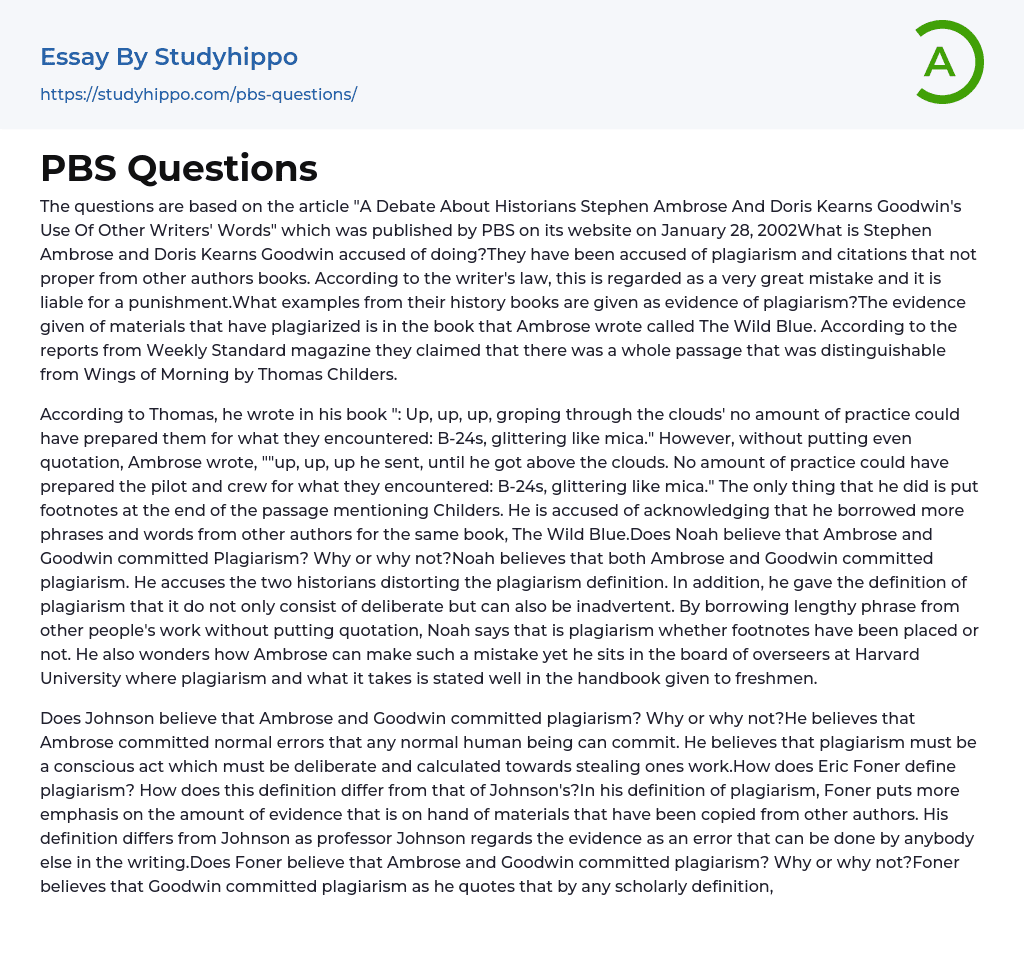The questions are based on the article "A Debate About Historians Stephen Ambrose And Doris Kearns Goodwin's Use Of Other Writers' Words" which was published by PBS on its website on January 28, 2002What is Stephen Ambrose and Doris Kearns Goodwin accused of doing?They have been accused of plagiarism and citations that not proper from other authors books. According to the writer's law, this is regarded as a very great mistake and it is liable for a punishment.What examples from their history books are given as evidence of plagiarism?The evidence given of materials that have plagiarized is in the book that Ambrose wrote called The Wild Blue. According to the reports from Weekly Standard magazine they claimed that there was a whole passage that was distinguishable from Wings of Morning by Thomas Childers.
According to Thomas, he wrote
...in his book ": Up, up, up, groping through the clouds' no amount of practice could have prepared them for what they encountered: B-24s, glittering like mica." However, without putting even quotation, Ambrose wrote, ""up, up, up he sent, until he got above the clouds. No amount of practice could have prepared the pilot and crew for what they encountered: B-24s, glittering like mica." The only thing that he did is put footnotes at the end of the passage mentioning Childers. He is accused of acknowledging that he borrowed more phrases and words from other authors for the same book, The Wild Blue.Does Noah believe that Ambrose and Goodwin committed Plagiarism? Why or why not?Noah believes that both Ambrose and Goodwin committed plagiarism. He accuses the two historians distorting the plagiarism definition. In addition, he gave the definitio
of plagiarism that it do not only consist of deliberate but can also be inadvertent. By borrowing lengthy phrase from other people's work without putting quotation, Noah says that is plagiarism whether footnotes have been placed or not. He also wonders how Ambrose can make such a mistake yet he sits in the board of overseers at Harvard University where plagiarism and what it takes is stated well in the handbook given to freshmen.
Does Johnson believe that Ambrose and Goodwin committed plagiarism? Why or why not?He believes that Ambrose committed normal errors that any normal human being can commit. He believes that plagiarism must be a conscious act which must be deliberate and calculated towards stealing ones work.How does Eric Foner define plagiarism? How does this definition differ from that of Johnson's?In his definition of plagiarism, Foner puts more emphasis on the amount of evidence that is on hand of materials that have been copied from other authors. His definition differs from Johnson as professor Johnson regards the evidence as an error that can be done by anybody else in the writing.Does Foner believe that Ambrose and Goodwin committed plagiarism? Why or why not?Foner believes that Goodwin committed plagiarism as he quotes that by any scholarly definition, plagiarism does not depends with motivation that a writer receivers from publishers to produce best sellers book but the evidence of plagiarism before hands. Through this, he was referring to the whole phrase that was copied from Wings of Morning by Thomas Childers by Ambrose.What happens to student at Harvard if they plagiarize?At Harvard, an undergraduate making an error of plagiarism is given a very stern sanction. He/she
is made to leave university for two semesters.
The student is not even allowed in the Cambridge and Massachusetts city. Hours that one had accumulated earlier is lost meaning lost money.Do you think that Ambrose and/or- Goodwin committed plagiarism? Why or why not?According to the definition that has been given by Merriam-Webster Dictionary, plagiarism is "to steal and pass off (the ideas or words of another) as one's own: use (another's production) without crediting the source." Therefore, as Ambrose and Goodwin used footnotes and according to dictionary definition they have not specified the type of accreditation that has to be given as a source, they have not committed plagiarism.
- Culture essays
- Social Control essays
- Citizenship essays
- Social Justice essays
- Caste System essays
- Social Responsibility essays
- Socialization essays
- Deviance essays
- Modern Society essays
- Popularity essays
- Civil Society essays
- Community essays
- Female essays
- Filipino People essays
- Igbo People essays
- Indigenous Australians essays
- Indigenous Peoples essays
- Minority Group essays
- Social Institution essays
- Men essays
- The nation essays
- Middle Class essays
- Social Norms essays
- Discourse Community essays
- Popular Culture essays
- Car Culture essays
- American Culture essays
- Mormon essays
- Indian Culture essays
- Mexican Culture essays
- Pop Culture essays
- Cultural Differences essays
- Culture Shock essays
- Different Cultures essays
- World War I essays
- World War Ii essays
- Atomic Bomb essays
- American Civil War essays
- Attack essays
- Cold War essays
- Crimean War essays
- Emilio Aguinaldo essays
- Iraq War essays
- Korean War essays
- Nazism essays
- Nuclear Weapon essays
- Philippine Revolution essays
- Trench Warfare essays
- Vietnam War essays
- Western Front essays




